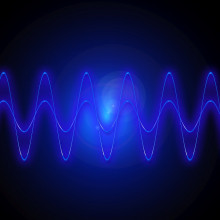Do our brains process sound or light faster?
Lionel got in touch to ask us about a curious phenomenon he's noticed since installing a new sensor, raising the question whether our brains process light or sound faster. Eva Higginbotham spoke with Brian Moore of the University of Cambridge who helped us unpick the answer...
In this episode

00:00 - QotW: Do we process sound or light faster?
QotW: Do we process sound or light faster?
Lionel wanted to know whether we process sound or light faster, so Eva Higginbotham’s been keeping her eyes and ears out for the answer...
Eva - I put the question to Brian Moore at the University of Cambridge, who’s an expert on hearing.
Brian - All of our sensations lag behind the time when the stimulus (like a light or a sound) reaches our sense organs, in this case eyes or ears. This happens partly because of the time it takes for the signal from your eyes or ears to reach the brain and partly because the brain takes time to process the signal to decide what it is. The time lag is usually at least 200 ms (one fifth of a second). In other words, the concept of “the present” is an illusion, as you are always operating at a slight lag.
Eva - That’s my excuse for next time I miss the ball playing tennis… But what do we process faster, sound or light?
Brian - When an object emits a sound and a light simultaneously, the light reaches our eyes slightly before the sound reaches our ears (because light travels faster than sound). Then, the brain appears to delay the perceived timing of the light relative to that for the sound, so that the two are perceived as roughly synchronous. So, when you look at someone’s face when they are talking, their lips appear to move synchronously with the sounds that they are producing. The farther away the talker is, the more the visual signal has to be delayed by the brain relative to the sound to achieve the appearance of the mouth moving at the same time as the sound you’re hearing. In other words, the brain compensates for the perceived distance of the source.
Eva - When put side by side, we react faster to a sudden sound than we do to a sudden visual cue. This is why the Olympics use a starting gun to signal the start of a race. It’s thought that we evolved this way as sound served as a really important detection system for predators that wanted to make us their dinner. However, this doesn’t account for Lionel’s experience of perceiving the light as coming on before he hears the sound.
Brian - This might be because the perceived timing of visual and auditory events can also be influenced by the actions that led to those events. Because you clap to activate the sensor and produce the light, your brain might interpret the clap as the cause of both the light and the sound, and “expects” the two to occur at the same time. However, because light travels faster than sound, the light reaches your eyes before the sound reaches your ears, and this makes the light appear to start slightly before the sound.
Eva - So it sounds like it’s some sort of combination effect from the fact that light travels faster than sound, and that you, Lionel, are the one making the sound. Might be worth getting a friend to clap with your back turned and see if you get the same result! Next week, we’ll be answering this question from Jonathan.
Jonathan - When you stir a bucket of water, I know the water is pushed to the outside, however, why do any particles end up the centre after the water has finished spinning? I have asked my Dad, but he doesn't know.










Comments
Add a comment